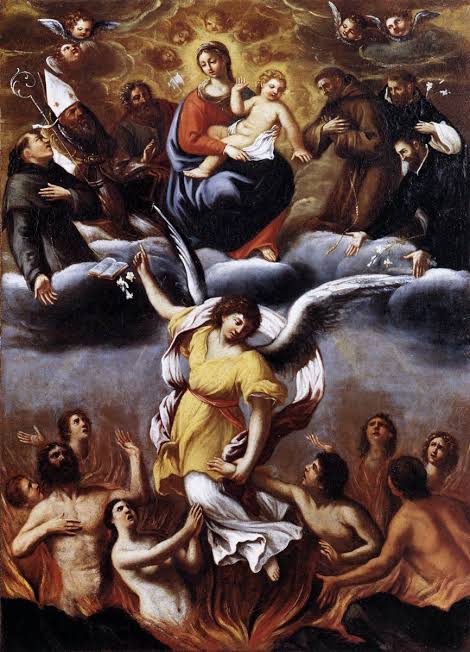Beyond the Grave: Purgatory and Mystery of God’s Mercy
FR. GEORGE ADIMIKE

Precisely because God’s mercy is beyond human categories and constraints, His dispensation of justice and grace goes beyond our comprehension. The Lord reveals the irreducible and absolute freedom of his majesty in the graciousness of His actions. Various sense-making narratives of the Scriptures underscore God’s sovereign liberty, which is mostly exercised as mercy – grace in action. As a result, God-self alone is the standard of mercy (cf. Ex. 33:19). There is no water without the combination of hydrogen and oxygen; likewise, there is no God whose name is not mercy. In the administration of His mercy, God reserves the right of the ultimate word. On account of the imperfect context of human existence, which affects the quality of our witnessing, salvation remains a gift of mercy.
In accordance with His will, God’s mercy transcends the limits and limitations of human existence. Our salvation meanders through mediations of instruments of God’s grace and mercy. It is such that only God, who sees the whole at once and can immediately fix all the aspects, has the ultimate word on one’s salvation. Theologically, the Church articulated this mystery of God’s mercy relative to salvation as purgatory. Yet, the ramifications of the richness of mysteries always transcend our articulation of them. And purgatory is no exception.
Human destiny is shrouded in mystery that the most fundamental questions of existence depend on God, whose goodness manifests in His faithfulness and compassion (Lam. 3:22-23). These divine tender mercies, which are all over His works (Psalm 145:9), serve as the warrant for our salvation. This mercy of God became manifest in the gift of His Son, Jesus Christ (Gal. 4:4; Jn. 1:14), who is the ultimate self-expenditure and definitive God’s self-disclosure. His sovereignty entails a reign beyond space; it entails supremacy beyond time. That is to say, He pardons and subdues our iniquities precisely on account of His delight in mercy (Micah 7:18-19) and according to its everlasting span (Psalm 136:3). Mercy, which indicates completely underserved favour expressed in withholding judgement, is intimately related to grace. With about 341 appearances in the Scriptures, mercy is a substantial theme in the revelation (cf. Deut. 4:31; 1 Chronicles 16:34; Psalm 89:28; Hos. 14:3; Lk. 1:50; Lk. 1:78; Lk. 6:36; Eph. 2 – 4; Rom. 9:15; Titus 3:5; 1Peter1:3; et al). We access it as grace, yet it grows within the matrix of law. God has linked salvation to the observance of the law of love, but He is not tied to the law. He is beyond the law and in Him is salvation. God’s mercy endures forever, not limited by death.God is always ‘magis’, and nothing defines Him. As a matter of faith, this understanding safeguards God from being locked in narrow appreciation of concepts and allows the conception of God to grow as our knowledge increases. In that way, since no human knowledge exhausts God, in conveying God-thought, religious messaging that overlook the analogical nature of God-talk with all its grandeur and limitation will corrupt the message.
Accessing and expressing divine mysteries in concepts that neither exhaust nor fully encompass the meaning they designate require the use of analogies. For the very fact that the concepts can only imperfectly contain the meaning of the mystery, there is an overflow between mystery and concepts. And divine mercy and purgatory fall within these mysteries. Mercy, the signature of God, characterizes His divine majesty. The name of God is mercy, and His justice is made manifest in His mercy. As a preface to the discussion of the grace of salvation relative to the doctrine of purgatory, we note that there is no repentance after death. However, it will be preposterous to argue that there is no mercy in the grave. Nothing can limit God’s mercy because it is coterminous with His essence. There is no repentance in the grave, but there is mercy in the grave (cf. Psalm 106:1; Psalm 107:1; Psalm 136:1 – 26).
Denying the eternal nature of the mercy of God is tantamount to a denial of His being. There cannot be God that is not almighty and all-merciful. The benevolence of His being funds the idea of purgatory. Some will be saved through grace by passing through ‘fire’. They will be purified by fire that is Christ. Those who love God and neighbours imperfectly within the human circumstances experience this purgation. Suffice it to say that the purgation is in Christ – whoever is in Christ is already saved. But the garment will be cleansed of every stain, and Christ does the final purification by deploying the merits of his redemptive event. This purgation happens in Christ and intensifies their friendship with him. This purification is theologically called purgatory, which many deny in principle, but all profess in practice, especially when everyone says the prayer for the dead, ‘Rest in peace’. The Scriptures give indications and allusions to purgatory in the following passages (cf. 1 John 5:17; Rev. 21:27; 1 Cor. 3: 11 – 15; 2 Maccabees 12: 39 – 45).
There is no repentance in the grave, and as such, there is no conversion after death. Our actions, thoughts and inactions relative to the existential appreciation of the law of the love of God and neighbour form a spiritual path and dynamism that connects one to the reality typical of one’s life. Thus, he/she reaps the dividend of his virtuous or vicious capital. In consequence, the fact of no repentance in the grave (Heb. 9:27) has been used to oppose the idea of purgatory since judgement follows death. However, the passage in question deals with the absolute singularity of the salvific value of Christ’s Paschal sacrifice. It is an affirmation of the sufficiency of the Paschal sacrifice and never an expo of the last day.
There is no repentance in the grave on the part of man, but on the part of God, mercy endures forever. Therefore, though there will be no longer an opportunity for conversion, souls who were in a state of grace can still experience a moment of mercy even after death because God’s mercy is not limited by space and time (cf. 1 Chronicles 16:34, Psalm 89: 28). The idea of heaven is not a zero-sum that excludes the purificatory process or moment of mercy. Purgatory is an absolute affirmation of the priority of receiving over making; of the primacy of grace over merit. Christ purifies the saved by the fire of his love for nothing defiled will be in heaven (Rev. 21:27), yet not all sins lead to death (1 John 5:7). Indeed, purgatory is a final bath for the eternal banquet.
Being that we always speak of mystery with human language, analogically purgation is like the final bath for the eternal banquet of the Lamb (Rev. 7:9, 19:7). Throughout our lives, we bath ourselves in-between the two great baths, which people do for us: regenerative bath at birth (baptism) and purificative bath at death (purgatory). Those who receive heaven directly are those theophoric, totally transparent of light that is Christ. Jesus Christ, the image of the invisible God (Col. 1:15), who is the perpetual overture of the Father to humanity, leads our recourse to the embrace of divine tenderness. It is, therefore, a noble and holy duty to immerse our loved ones within the stream of Christ’s Paschal grace. Offering Masses for the dead, more than anything else, inserts our loved ones within the currency of the salvific event of Christ, which alone saves. The feast of all souls is an invitation to true and real communion with all our loved ones in prayers knowing full well that love never ends, and that since God’s mercy endures forever, then He can extend His mercy to them. Purgatory is, therefore, a confession that even though there is no repentance in the grave, there is always mercy beyond the grave.
– Fr George Adimike













